Analysis
Copier Careers 2017 Service Technician Salary Survey

In an industry that has witnessed remarkable change in recent years, the outlook is for even more change — especially for copier technicians. As the Copier Channel generates more jobs for hybrid technicians, the need for a nimble, adequately trained workforce grows. Expanding opportunities for copier techs in turn creates pressure on Copier Channel employers to retain, recruit and/or train a new generation of hybrid techs.
“The industry is rapidly evolving into a very technical field,” said Paul Schwartz, president of Copier Careers.® “Our job orders for recruiting service techs with IT and networking skills increase every year. The industry continues to evolve from a break-fix service model to one that involves IT solutions, and that will affect hiring, training and compensation.”
The 2017 Service Technician Salary Survey
Over the past 15 years, Copier Careers, the only nationwide recruiting firm dedicated exclusively to the Copier Channel, has asked professionals from across the industry about their compensation, job satisfaction and other work-life issues. This year 4,708 copier techs participated in our survey, up nearly 300 from last year. The respondents work across the industry, and their responses reflect the changing landscape in which they work.
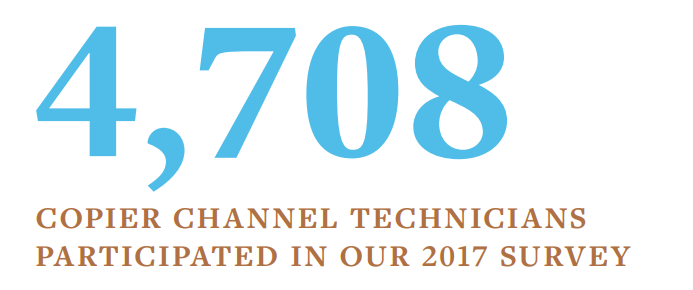
Copier Techs by the Numbers
This year 4,708 copier service technicians responded to our online Service Technician Salary Survey. The resulting snapshot shows an industry with some growing pains. Demand for qualified service techs is up; salaries have increased slightly, and technicians report being increasingly open to changing jobs.
Seventy-one percent of those who took our 2017 Service Technician Salary Survey said they are “actively” or “somewhat” looking for a new job.
“Today the Copier Channel is like a hot real-estate market. If you want to hire good people, you need to jump on it,” said Paul Schwartz, president of Copier Careers. “In this salary survey, we had an all-time high of 34 percent of respondents who said they are actively looking for a new job.”
Of those responding, 88 percent pointed to “job opportunities too good to pass up,” and 81 percent said they also “want higher compensation.”
“Many techs say they are looking for a more dynamic environment and the opportunity for more training,” Schwartz said. “We see why their interest is high, because we have a very high number of job orders for qualified copier techs.”
In 2017, news reports verify that information technology and computer tech jobs are a hot-growth area across the United States. This intersects with staffing needs in the Copier Channel — and is driving a demand for higher salaries in the channel.
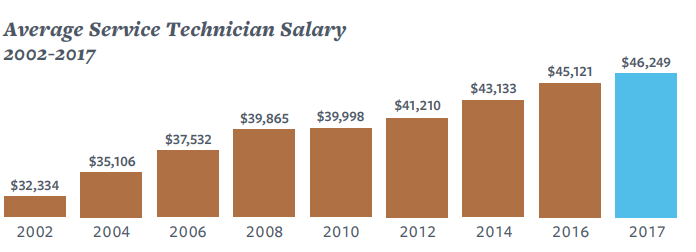
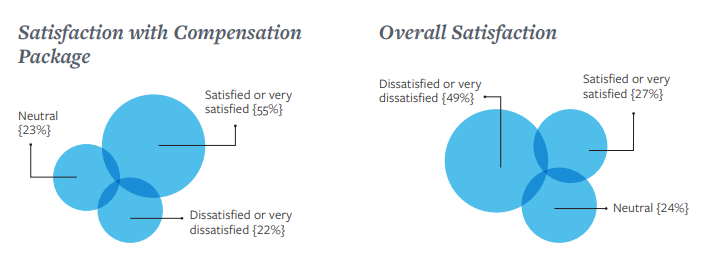
2017 Salary and Benefits
The average salary for a copier service technician increased in 2017 by 2.5 percent to $46,249 from 2016. On average, technicians also earned $6,121 in cash rewards in 2017. This included certification and training rewards, retention, performance and signing bonuses and project completion awards.
One indicator that Copier Channel employers are focused on finding qualified candidates to fill increasing high-tech jobs is reflected in the fact that 13 percent more copier techs reported receiving signing bonuses in the past year.
In 2017, copier techs reported the top forms of non-cash compensation, included:
- 99 percent received health insurance benefits
- 99 percent were reimbursed for the cost of obtaining certifications
- 89 percent received employer-sponsored education and training
- 79 percent had access to a company car or a car allowance, an increase of 6 percentage points from 2016
Slightly more than half of survey respondents (55 percent) said they are very satisfied or satisfied with their compensation. Twenty-three percent held a neutral opinion, and 22 percent reported being dissatisfied or very dissatisfied with their compensation.

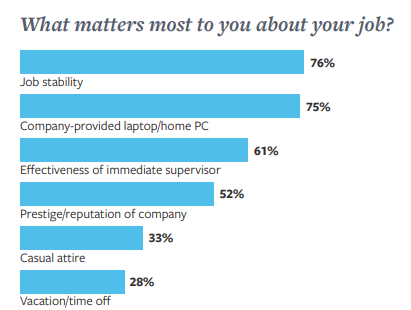
While the majority of survey respondents (55%) said they are satisfied with their compensation, they also identified other factors that would improve their job satisfaction. “The effectiveness of immediate supervisor” was up 6 percentage points to 61 percent in 2017.
“Much of what copier techs want hinges on the effectiveness of their immediate supervisor,” said Jessica Crowley, business development manager and senior recruiter at Copier Careers. “When it comes to the reasons people want to move on, morale is a big driver. Effective supervisors tend to be proactive, which has an effect on the day-to-day work of copier techs, their access to training, bonuses and feeling that they are part of a team.”
For one copier tech, negative job satisfaction arose from a lack of logistical support that made earning bonuses difficult:
“Our bonus program is driven by meter clicks, but since techs have no control over the equipment they service or how many copies per month customers run, they have no control over their bonus. It’s frustrating. I’ve been doing this for almost 30 years, and I’m weary of the extravagance spent ‘motivating’ the sales force, while service can’t get a cost of living raise.”
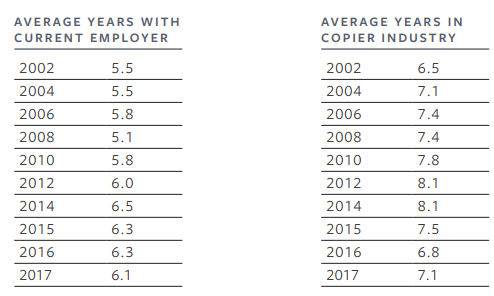
Not long ago, we would be surprised that there was a woman in a tech position… the indicator doesn’t surprise us anymore.
Copier service technicians who took this year’s salary survey identified where they work by type of copier business. This included:
- 28 percent at IT/MNS service providers, an increase of 9 percentage points
- 26 percent at single-location independent copier dealers
- 24 percent at multi-location regional dealers
- 16 percent at OEMs
- 1 percent at national sales and service and other third-party organizations
On average, a technician is just shy of 34 years old and has worked in the Copier Channel for 7.1 years — an increase from last year, when average time in the field was 6.8 years.
In 2017, 25 percent of copier technicians were women, an increase of 1 percentage point over 2016. That reflects an 11-point increase since 2010. In 2002 — the first year of the Salary Survey — only 4 percent of copier technicians were women.
“Not long ago, we would be surprised that there was a woman in a tech position in the industry,” Schwartz said. “Now we see more women in the tech side of the industry. The indicator doesn’t surprise us anymore, and it’s great to see the number of women in the industry growing.”
Copier techs spend 52 hours per week on the job on average, plus an additional six hours on-call after hours — this is one hour more spent on-call than techs reported working in 2016.
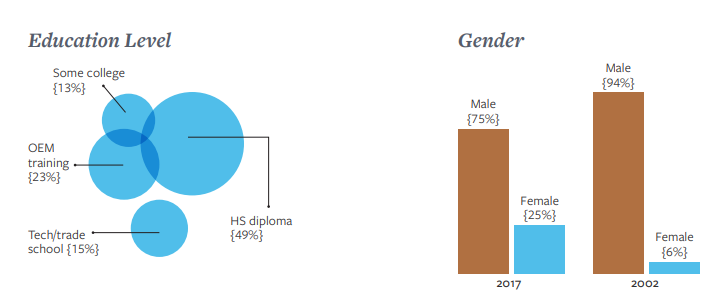
Today the Copier Channel is like a hot real-estate market. If you want to hire good people, you need to jump on it.
A Workforce in Transition
As more copier technicians gain the networking and IT capabilities to become hybrid technicians, we will likely see continued flux in the channel as network-trained technicians move on to higher paying IT jobs in other industries — unless Copier Channel compensation, training and job satisfaction increase enough to keep technicians in the fold.
“As service technician jobs have evolved from primarily break-fix skills to include IT and programming abilities, techs want to be compensated for their additional training and skills,” Crowley said.
She said this year’s survey could be used as a guide for employers who want to know what it will take to retain skilled technicians. Beyond compensation, she noted, the real keys to satisfaction involve being recognized for good work, skill development and being encouraged to innovate.
“We hear again and again that techs want to work with highly talented peers, they want to learn new skills and they want to be part of cross-functional teams.”
For one respondent, the employer and employee share responsibility for creating success and job satisfaction:
“I think talent and persistence are tied together for career success. Innate talent can only get you so far, and one must make the effort to learn new things.”
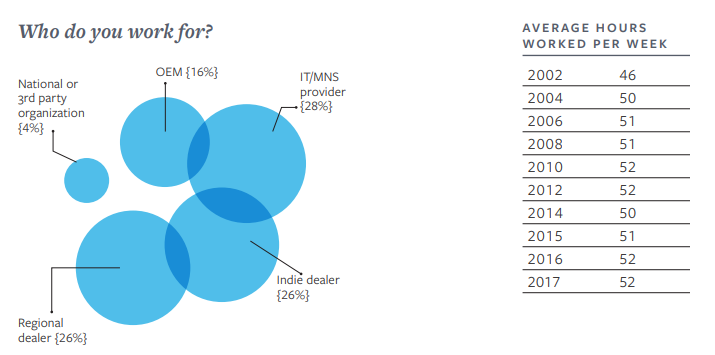
The real keys to job satisfaction involve being recognized for good work, skill development and being encouraged to innovate.
Clearly, the bottom line in job satisfaction for copier techs involves a lot more than a paycheck. One indicator is that 29 percent of respondents said they want to know that their work is important to the company’s success, an increase of 9 percentage points in this year’s survey.
In the 2017 survey, service techs identified the “extras” that would encourage them to stay in the Copier Channel. Of the respondents to this year’s survey:
- 87 percent want to know their company understands the importance of IT
- 82 percent want the ability to work on “new” innovative IT solutions
- 78 percent want to have the tools and support to do their job well
- 66 percent want to be recognized for work well done
- 64 percent want more skill development and educational/training opportunities
- 60 percent want to feel that their opinion and knowledge is valued
“Many copier techs want to feel their work contributes to the company’s success, and they understand that creating solutions involves working with others across the organization in new and innovative ways,” Crowley said.
One respondent described the pride in feeling that their job and output contributed to the company’s success:
“The copier dealer that I worked for was bought out by another dealer, and the transition to the new company has been just amazing. We built a new shop, got more techs to build equipment, tripled the output from the shop and had the tools and resources to accomplish it. I love what this company does and how it is done.”
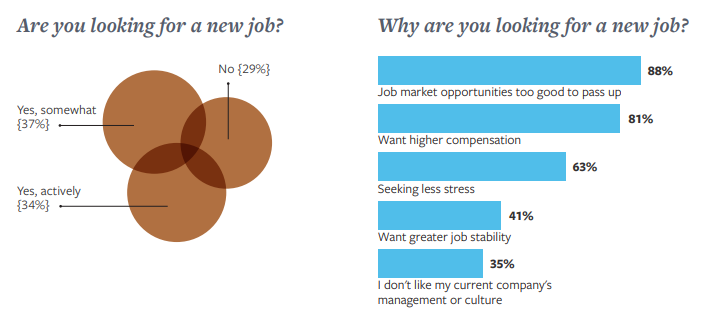
Copier techs… are eager to learn, collaborate and use their skills to advance organizational goals. They also want to be fairly compensated…
The Prospect Is for Change – in a Good Way
When 88 percent of 2017 survey respondents say that the market for service techs has opportunities that are too good to pass up, it is more than a wake-up call. It is a call to action. Answering the call will require responsiveness across the industry — from sales and marketing to leadership, technicians and the back office.
Technology changes. Markets expand. Solutions evolve. The choice is the same one faced by the Neanderthals: Adapt or Die.
What form with adaptation take? It probably will vary across the Copier Channel, but it will involve embracing change, encouraging innovation and investing in talent. It will require bold thinking, building teams with the capacity to innovate across specialties and upgrading training to keep pace with ever-evolving technology.
The good news is that copier techs who responded to the 2017 survey are eager to learn, collaborate and use their skills to advance organizational goals. They also want to be fairly compensated for skills that are in high demand inside and outside the copier industry.
“To attract and retain top technical talent, dealerships will have to make sure their compensation is competitive,” Schwartz said. “Service departments that are adequately staffed are a foundation of the core business, and it grows from there.”
To its credit, the Copier Channel has a remarkable track record of being resilient and remaining relevant in changing times. It remains an integral partner for industries, schools and government. The industry has a great track record of adapting, creating technology and services that change as business needs evolve.
Of course, change is hard. But extinction is worse. The challenge is to limber up, be flexible and meet the future head on. -CC
Stay Tuned for Our Other 2017 Salary Surveys
- July – Sales Manager Salary Survey
- August – Service and Operations Managers Salary Survey
- December – Sales Representative Salary Survey
ABOUT US
Copier Careers® is a recruiting firm dedicated exclusively to helping copier channel employers find experienced service techs, copier sales reps, sales managers, service & operations managers, controllers, back office staff, and MPS/MNS experts. Learn more about our commitment to the copier channel at www.CopierCareers.com or call 888-733-4868 to talk to a recruiter.
© 2017 CopierCareers.com. Schwartz & Co., LLC dba Copier Careers®. All rights reserved.
